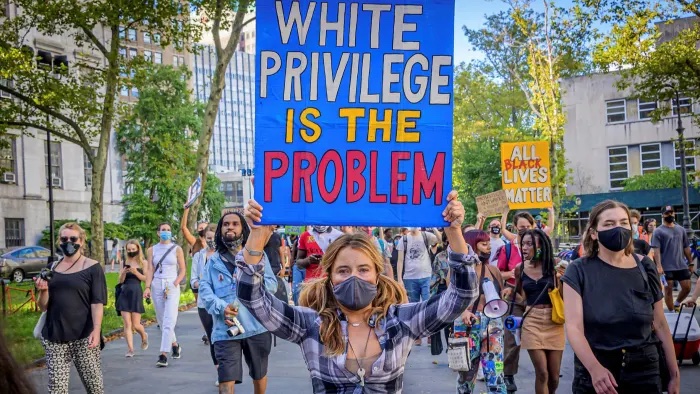News
For white Americans, anti-racism training has never been more necessary

Opinion US race relations

OCTOBER 26 2020 A ‘racial healing circle’ in Chicago holds lessons for how to discuss white privilege
“My feeling is that white people have a very, very serious problem. And they should start thinking about what they can do about it. Take me out of it.” The African-American writer Toni Morrison made this point more than a quarter of a century ago: that white Americans need to tackle their own racism without expecting non-white Americans to help them do so. This year, the point has been made frequently since May when a white policeman suffocated to death George Floyd, an African-American, sparking nationwide protests against racism and police brutality. It is one many white Americans struggle with. How can we challenge our inherent, sometimes unconscious racism, without being able to seek the advice of those who suffer most from it? I turned to Truth, Racial Healing and Transformation Greater Chicago, which runs “healing circles” in the highly racially segregated city where I live. I signed up for a four week “white affinity” group, designed to help me learn — from other white people — how to talk about white privilege in my own life, especially when I least want to see it. Donald Trump recently banned this kind of racial sensitivity training in the US federal government and federal contractors. The president’s executive order said the goal was to “combat offensive and anti-American race and sex stereotyping and scapegoating”. He went on to declare himself, at last week’s final presidential debate, “the least racist person” in the room. Swamp notes In the countdown to the 2020 election, stay on top of the big campaign issues with our newsletter on US power and politics with columnists Rana Foroohar and Edward Luce. Sign up here So Mr Trump is certainly not signing up for diversity training. And I, too, believed I had lived a lifetime on the right side of racism — until recently. As a child, I devoured works by black writers, getting special permission at the age of 10 to borrow from the library’s adult collection so I could read the writings of black nationalist Malcolm X. I spent 20 years in Africa, including covering the end of apartheid in South Africa for the Financial Times — and writing a book about it. I adopted two non-white kids. Racists don’t act like that, do they? My time in the white affinity circle taught me that sometimes they do. As we gathered every Thursday on a Zoom call, I faced questions like: have you ever benefited from racism in your community or workplace? Have you ever perpetrated racism yourself, or witnessed it, and what do you wish you’d done differently? When have you called out someone else for a racist comment — or failed to do so? I pointed out that, as a white person living in Ghana in 1980, I was treated like royalty: Ghanaians often told me I looked “just like Lady Diana” Spencer, who would become the UK’s Princess of Wales. Living in South Africa under apartheid, I used segregated hospitals. As a child in the 1950s, I remember “whites-only” drinking fountains. But of course that’s cheating, because it’s ancient history. To this day, I live in the almost entirely white side of a town that also has a black side. I chose this town because the high school is majority non-white, and I wanted my kids to get the kind of education that was impossible for me. But that doesn’t get me off the hook either. The real question for me was the final one: do I speak up when others call coronavirus the “Kung Flu” or say other racist things? Or do I act the innocent bystander to racism, because my generation was taught not to “rock the boat”, especially if relatives or neighbours are involved? Jose Rico, director of TRHT Greater Chicago, says “what it comes down to a lot of the time is whether white people want to give up stuff, the question we get is, ‘I want to help but I don’t necessarily want to give up any of my comfort or privilege’.” That’s the question for me: do I call out racism, even when it may spoil a close relationship? Should I try to deliver that message in a way that doesn’t immediately trigger defensiveness from the person challenged? When did shaming someone ever change their opinion — even if condemning them does make me feel virtuous? Clearly anti-racism training is the work of a lifetime. And whatever happens in next week’s US election, I’ll doubtless need more of it in future. TRHT Greater Chicago is so worried about post-vote racial violence that it has trained 300 racial healing practitioners just to get ready for the next few difficult months.